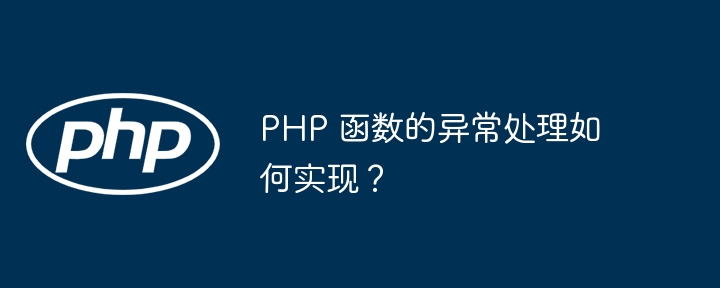How to implement exception handling in PHP functions?
Exception handling functions can help capture and handle errors during application execution. PHP provides the following functions: set_exception_handler(): Set a custom exception handling function. restore_exception_handler(): Restore the default exception handling function. trigger_error(): Trigger user-defined errors or warnings. debug_backtrace(): Get the function call stack.

Exception handling of PHP functions
Exception handling is a very important function that can help us capture and handle errors that occur during application execution . PHP provides a rich set of functions for handling exceptions, which allow us to write robust and easy-to-maintain code.
Introduction to Exception Handling
Exception is an event that indicates that the program encountered an unusual or unexpected situation during execution. Exceptions are usually caused by errors, syntax errors, or insufficient resources.
To handle exceptions we need to use try...catch...finally blocks. The try block contains code that may throw an exception, the catch block contains code that is executed when an exception occurs, and the finally block is always executed regardless of whether an exception occurs.
Exception handling function
PHP provides the following functions to handle exceptions:
-
set_exception_handler(): Set a custom exception handling function . -
restore_exception_handler(): Restore to the default exception handling function. -
trigger_error(): Trigger a user-defined error or warning. -
debug_backtrace(): Get the function call stack.
Practical case
The following is an example of using the try...catch...finally block to handle exceptions:
try {
// 可能引发异常的代码
$file = fopen('myfile.txt', 'r');
if (!$file) {
throw new Exception('无法打开文件');
}
} catch (Exception $e) {
// 异常处理代码
echo '发生错误:' . $e->getMessage();
} finally {
// 无论是否发生异常都会执行的代码
if (isset($file)) {
fclose($file);
}
}In In the above example, the try block attempts to open a file. If the file cannot be opened, an Exception will be thrown. catch block catches this exception and prints an error message. finally The block is always executed and open files are closed within the block.
Custom Exceptions
PHP also allows us to create our own custom exception classes. This can help us create application-specific exceptions and provide more fine-grained error handling.
To create a custom exception class, we need to inherit the Exception class. Here is an example:
class MyException extends Exception {
public function __construct($message, $code = 0, Exception $previous = null) {
parent::__construct($message, $code, $previous);
}
}In the above example, we created a custom exception class named MyException. This class inherits from the Exception class and provides a constructor to initialize the exception message, error code, and previous exception.
We can use our custom exception class as shown below:
try {
// 可能引发异常的代码
if (someCondition) {
throw new MyException('自定义异常消息');
}
} catch (MyException $e) {
// 处理自定义异常的代码
echo '发生自定义错误:' . $e->getMessage();
}Conclusion
Exception handling is a powerful feature in PHP, which can help us write robust and Easy to maintain code. By using try...catch...finally blocks and exception handling functions, we can handle errors gracefully and ensure that the application continues to run even when unexpected circumstances occur.
The above is the detailed content of How to implement exception handling in PHP functions?. For more information, please follow other related articles on the PHP Chinese website!

Hot AI Tools

Undresser.AI Undress
AI-powered app for creating realistic nude photos

AI Clothes Remover
Online AI tool for removing clothes from photos.

Undress AI Tool
Undress images for free

Clothoff.io
AI clothes remover

AI Hentai Generator
Generate AI Hentai for free.

Hot Article

Hot Tools

Notepad++7.3.1
Easy-to-use and free code editor

SublimeText3 Chinese version
Chinese version, very easy to use

Zend Studio 13.0.1
Powerful PHP integrated development environment

Dreamweaver CS6
Visual web development tools

SublimeText3 Mac version
God-level code editing software (SublimeText3)

Hot Topics
 CakePHP Project Configuration
Sep 10, 2024 pm 05:25 PM
CakePHP Project Configuration
Sep 10, 2024 pm 05:25 PM
In this chapter, we will understand the Environment Variables, General Configuration, Database Configuration and Email Configuration in CakePHP.
 PHP 8.4 Installation and Upgrade guide for Ubuntu and Debian
Dec 24, 2024 pm 04:42 PM
PHP 8.4 Installation and Upgrade guide for Ubuntu and Debian
Dec 24, 2024 pm 04:42 PM
PHP 8.4 brings several new features, security improvements, and performance improvements with healthy amounts of feature deprecations and removals. This guide explains how to install PHP 8.4 or upgrade to PHP 8.4 on Ubuntu, Debian, or their derivati
 CakePHP Date and Time
Sep 10, 2024 pm 05:27 PM
CakePHP Date and Time
Sep 10, 2024 pm 05:27 PM
To work with date and time in cakephp4, we are going to make use of the available FrozenTime class.
 CakePHP File upload
Sep 10, 2024 pm 05:27 PM
CakePHP File upload
Sep 10, 2024 pm 05:27 PM
To work on file upload we are going to use the form helper. Here, is an example for file upload.
 CakePHP Routing
Sep 10, 2024 pm 05:25 PM
CakePHP Routing
Sep 10, 2024 pm 05:25 PM
In this chapter, we are going to learn the following topics related to routing ?
 Discuss CakePHP
Sep 10, 2024 pm 05:28 PM
Discuss CakePHP
Sep 10, 2024 pm 05:28 PM
CakePHP is an open-source framework for PHP. It is intended to make developing, deploying and maintaining applications much easier. CakePHP is based on a MVC-like architecture that is both powerful and easy to grasp. Models, Views, and Controllers gu
 How To Set Up Visual Studio Code (VS Code) for PHP Development
Dec 20, 2024 am 11:31 AM
How To Set Up Visual Studio Code (VS Code) for PHP Development
Dec 20, 2024 am 11:31 AM
Visual Studio Code, also known as VS Code, is a free source code editor — or integrated development environment (IDE) — available for all major operating systems. With a large collection of extensions for many programming languages, VS Code can be c
 CakePHP Creating Validators
Sep 10, 2024 pm 05:26 PM
CakePHP Creating Validators
Sep 10, 2024 pm 05:26 PM
Validator can be created by adding the following two lines in the controller.






